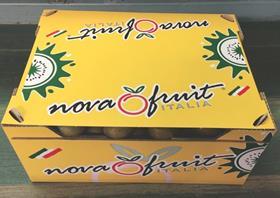
Italian company Novafruit has built a reputation in the Middle East as a reliable source of fruit not just from Italy but a range of other sources, helping customers ensure 12-month supply and ensuring that its own future development isn't entirely dependent on the ups and downs of its domestic market, or indeed the European one.
“We started out more than 25 years ago in the Middle East market with Italian products, but using the good relationships we had with our clients we were soon able to start offering other sources of supply in South America, South Africa and Spain,” explains the group’s president, Luca Antonietti.
As a result, the company now sources from a broad range of suppliers: apples, kiwifruit and grapes from Italy and Chile, Spanish citrus, stonefruit, grapes and pears, Ecuadorean bananas, Argentinean citrus and pears, and Peruvian grapes; and it supplies markets across the region, working mainly with importer-distributors in the UAE, Saudi Arabia, Qatar, Bahrain, Kuwait and Oman.
Novafruit has also been able to capitalise on changes in demand for fresh fruit in the Middle East. For example, the Philippines has long been the dominant player in the region’s banana market, but lately its exporters have reportedly struggled to guarantee consistent quality and availability.
Antonietti says this has created new opportunities. “Ecuador has really got a foothold in the Middle East banana market over the past couple of years, and what’s more its fruit is now more appreciated by customers here,” he explains.
ITC trade data show that between 2012 and 2016 Filipino banana export sales to the UAE fell by 21 per cent to US$27.3m (96,614 tonnes).
During the same period, they fell 18 per cent to US$15.8m (52,510 tonnes) in Saudi Arabia and 3 per cent to US$19.0m in Kuwait (47,629 tonnes).
Only in Iran did sales rise by 3 per cent to US$23.3m, (89,878 tonnes), but this included a 27 per cent drop in value during 2016.
By contrast, Ecuadorean banana sales during 2012-2016 rose 146 per cent to US$19.4m in the UAE (42,195 tonnes); 105 per cent to US$21.1m in Iraq (48,971 tonnes); 306 per cent to US$31.7m in Kuwait (71,346 tonnes); 51 per cent to US$72.6m in Saudi Arabia (158,798 tonnes); and by an unspecified margin to US$22.3m in Iran (49,127 tonnes).



